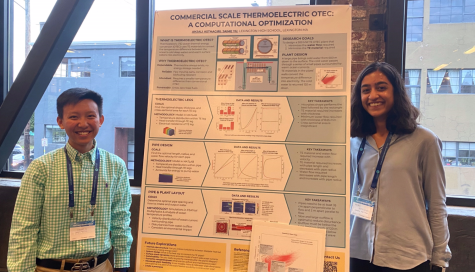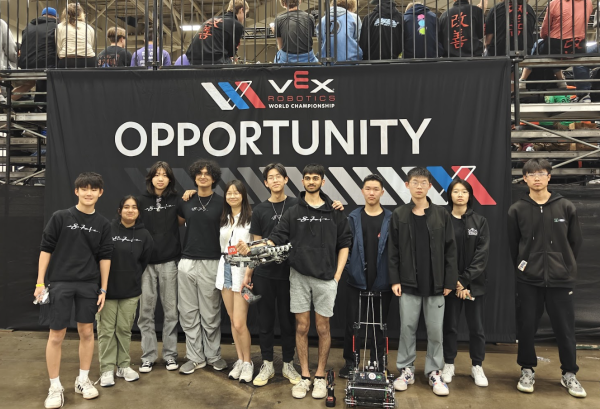Two Lexington High School Seniors Attend Marine Energy Research Conference
December 12, 2022
Jaime Yu and Anjali Asthagiri, two seniors at Lexington High School, recently participated in a marine energy research conference in Portland, Ore. The University Marine Energy Research Community (UMERC) collaborated with the Marine Energy Technology Symposium (METS) to hold the conference on Sept. 14 and 15. The two students presented their work on energy conversion in thermoelectric oceans.
Yu and Asthagiri have worked on this project since June 2021 to provide insight into the possibilities of utilizing renewable energy to combat climate change.
“I think that renewable energy is one of the big problems in our world as we’re moving away from fossil fuels and in the face of climate change,” Yu said.
Currently, people around the world still use energy from fossil fuels to maintain their lifestyles. However, using nonrenewable energy sources releases greenhouse gasses into the Earth’s atmosphere and has harmful consequences. In response to the increasing need to change people’s lifestyles, scientists worldwide, like Yu and Asthagiri, have researched possible solutions to the problem.
Yu and Asthagiri’s research addresses some of the shortcomings of ocean thermal energy conversion (OTEC). OTEC uses the ocean’s thermal gradient—a metric that describes the natural difference in temperature of the ocean surface and at its depths. In OTEC, power is generated by the warmer ocean water evaporating in immense heat accumulation pumped from the ocean’s surface, which turns the turbine that produces electrical energy. It is then cooled by the ocean water pumped from lower depths. Little is altered in thermoelectric (TE) OTEC, except a moving part used in regular OTEC is eliminated and replaced by a series of tubing. Material thickness, shape, cross-sectional areas, and pipe spacing were all factors taken into consideration by Yu and Asthagiri in maximizing the energy efficiency and heat flow of their TE OTEC system model.
“We concluded that a TE OTEC plant has minimal environmental impacts and can become a competitive renewable energy option in the world today,” Yu and Asthagiri said.
Harnessing ocean energy is important to climate change because there are many caveats to contemporary renewable energy sources. Solar panels are an example of this.
“We think that [solar panels are] this great thing, but in reality, we can’t actually recycle the silicon dioxide in them,” Yu said.
He stated that it is difficult to gain more energy output than input with current energy sources. As a result, scientists, like those at the UMERC conference, are searching for alternative ways to obtain energy. Asthagiri and Yu also attended other meetings during their research process, such as the National Renewable Energy Laboratory (NREL). The conferences are often co-run, involving international participants.
“There are professors, there are businessmen from all over the nation,” Asthagiri said.
Although global warming affects many communities, the contributions of students like Yu and Asthagiri create hope.








